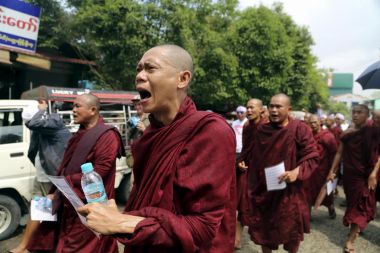Burma: Religious freedom is under threat, warns rights group

Draft laws passed by Burma's parliament violate fundamental human rights, according to the charity Human Rights Watch, and the country's President Thein Sein should refuse to sign them into law.
Parliament approved the Religious Conversion Bill and the Monogamy Bill, two of four contentious so-called "race and religion" laws, on August 21.
The four laws also include the Population Control Law, which became law in May, and the Interfaith Marriage Law, passed by parliament in July but as far as the government has revealed, not yet signed into law. They have been promoted by the ultra-nationationalist organisation of Buddhist monks, the Association for Protection of Race and Religion (known by its Burmese acronym Ma Ba Tha).
The law will create local Religious Conversion Scrutinization and Registration Boards. Anyone wishing to change their religion will have to be over 18 and will be required to file an application with a local board, including the reasons for the conversion.
The applicant would be interviewed by at least five board members, followed by a 90-day study period for the applicant to examine the "essence of the religion, marriage, divorce, and division of property practices in that religion, and inheritance and parenting practices in that religion". If the board approves the conversion, the applicant would then get a certificate of conversion.
According to HRW, there are concerns that the make-up of many local boards will be predominantly ethnic Burman Buddhist officials, who may be biased against conversions from Buddhism to other religions. Information collected about the applicant would be forwarded to national religion, immigration and identification agencies, which HRW says would interfere with their right to privacy.
The law also prohibits converting with the intent to "insult, disrespect, destroy, or abuse a religion" and bars anyone from bullying or enticing another person to convert or deterring them from doing so.
HRW also criticises the Monogamy Bill, which prohibits a married person from entering a second marriage or "unofficially" living with another person while still married. The Bill sets out punishments for violations, including loss of property rights upon divorce for the spouse who is guilty of breaking the monogamy law.
HRW says the Bill is intended to target religious minorities where polygamy and extra-marital affairs are perceived to occur more frequently. It also says that laws criminalising consensual sex disproportionately impact women – for example, a rape victim may be deterred from filing a criminal complaint if the failure to win a conviction puts her at risk of prosecution for adultery.
"By passing these two draft laws, Parliament has ignored basic human rights and risks inflaming Burma's tense intercommunal relations, threatening an already fragile transition ahead of landmark elections," said Phil Robertson, HRW's deputy Asia director. "These discriminatory laws could fuel anti-Muslim sentiment, so Thein Sein should demonstrate solid leadership, stand up for rights, and refuse to sign them."
He added: "Allowing local officials to regulate private faith so closely is a pathway to repression of religious freedom. In their zeal to protect Buddhism, the authors of these laws are imperiling other religious minorities, including Christians, Hindus, and especially Burma's persecuted Muslim minority."
Robertson said that Burma's main overseas donors – Japan, the European Union, the UK, and the US – should "publicly condemn these laws and call for their immediate repeal".











